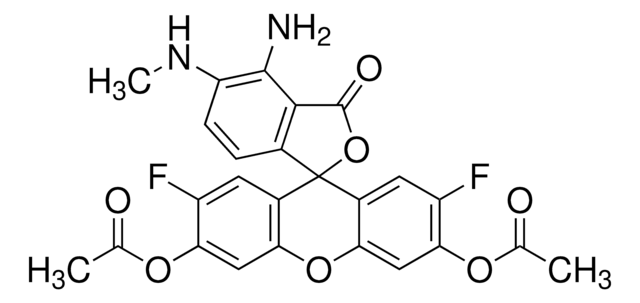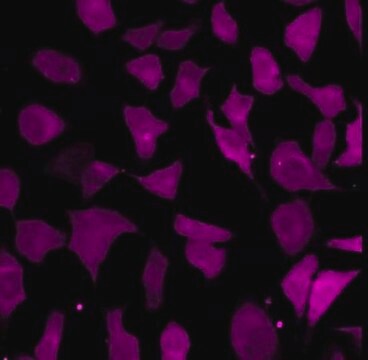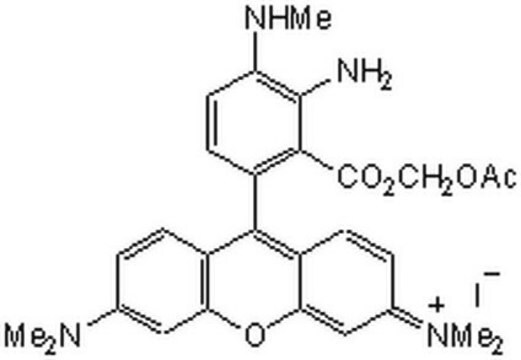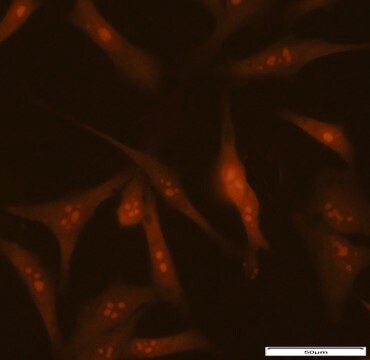SCT053
Colorante per cellule vive nel vicino infrarosso BioTracker SiRNO (ossido nitrico)
Live cell imaging dye for cellular nitric oxide (NO) localized to mitochondria and lysosome, used as an indicator of host defense, homeostasis and developmental functions.
Sinonimo/i:
Live cell imaging probe
Autenticatiper visualizzare i prezzi riservati alla tua organizzazione & contrattuali
About This Item
Codice UNSPSC:
12352207
NACRES:
NA.47
Prodotti consigliati
Saggio
≥98% (H-NMR)
≥98% (HPLC)
≥98% (LC/MS)
≥98% (elemental analysis)
tecniche
cell based assay: suitable
Metodo di rivelazione
fluorometric
Descrizione generale
L'ossido nitrico (No) è una specie azotata reattiva prodotta dall'ossido nitrico sintasi (NOS). L'NO è coinvolto in molti processi fisiologici, tra cui la regolazione della pressione sanguigna, l'omeostasi, l'attivazione del sistema immunitario, la comunicazione neurale, la contrazione del tessuto muscolare liscio e del tessuto vascolare. Pertanto, il rilevamento e la quantificazione dell'NO sono fondamentali per comprendere gli stati di salute e di malattia.
Il colorante BioTracker<TMSYMBOL></TMSYMBOL> SiRNO-ossido nitrico è una sonda per imaging fluorescente nel vicino infrarosso per la rivelazione di ossido nitrico (NO). La sonda identifica specificamente l'NO nei mitocondri e nel lisosoma delle cellule viventi. La sonda non mostra reattività incrociata con una varietà di biomolecole e altre specie reattive, tra cui: acido ascorbico (AA), acido deidroascorbico (DHA), metilgliossale (MGO), GSH, Cys, Hcy, H2O2, ClO−, -OH, O2−, NO2− e ONOO−. Il colorante SiRNO non è sensibile al pH nell'intervallo 5,5-8,0, dimostrando di essere adatto all'intervallo di pH fisiologico. Il colorante SiRNO è stato utilizzato con successo per rilevare l'NO in cellule vive, tessuti animali ed esperimenti in vivo.
Proprietà spettrali
Assorbimento: 633 nm
Emissione: 650-750 nm
Il colorante BioTracker<TMSYMBOL></TMSYMBOL> SiRNO-ossido nitrico è una sonda per imaging fluorescente nel vicino infrarosso per la rivelazione di ossido nitrico (NO). La sonda identifica specificamente l'NO nei mitocondri e nel lisosoma delle cellule viventi. La sonda non mostra reattività incrociata con una varietà di biomolecole e altre specie reattive, tra cui: acido ascorbico (AA), acido deidroascorbico (DHA), metilgliossale (MGO), GSH, Cys, Hcy, H2O2, ClO−, -OH, O2−, NO2− e ONOO−. Il colorante SiRNO non è sensibile al pH nell'intervallo 5,5-8,0, dimostrando di essere adatto all'intervallo di pH fisiologico. Il colorante SiRNO è stato utilizzato con successo per rilevare l'NO in cellule vive, tessuti animali ed esperimenti in vivo.
Proprietà spettrali
Assorbimento: 633 nm
Emissione: 650-750 nm
Applicazioni
Categoria della ricerca
Imaging di cellule
Imaging di cellule
Colorante per l'imaging di cellule vive per l'ossido nitrico (NO) cellulare localizzato nei mitocondri e nel lisosoma, utilizzato come indicatore delle funzioni di difesa, omeostasi e sviluppo dell'ospite.
Imaging in fluorescenza di cellule vive
Sottocategoria di ricerca
Colorante per cellule vive
Colorante per cellule vive
Qualità
Purezza: ≥ 98% confermata mediante HNMR, LC-MS e HPLC e analisi elementale
Massa molare: 758,34 g/mol
Massa molare: 758,34 g/mol
Stato fisico
Liofilizzato
Stoccaggio e stabilità
Conservare il colorante di cellule vive BioTracker SiRNO-ossido nitrico a -20 °C, essiccato e al riparo dalla luce
Nota: Prima dell′apertura, centrifugare brevemente il contenitore per raccogliere sul fondo tutto il contenuto.
Nota: Prima dell′apertura, centrifugare brevemente il contenitore per raccogliere sul fondo tutto il contenuto.
Esclusione di responsabilità
Salvo diversa indicazione nel nostro catalogo o in altra documentazione fornita dall′azienda insieme al prodotto, i nostri prodotti sono destinati esclusivamente a scopi di ricerca e non devono essere utilizzati per altre finalità, inclusi a titolo esemplificativo ma non esaustivo, fini commerciali non autorizzati, applicazioni diagnostiche in vitro, usi terapeutici ex vivo o in vivo o qualsiasi altro tipo di assunzione o applicazione rivolta agli esseri umani o agli animali.
Codice della classe di stoccaggio
11 - Combustible Solids
Classe di pericolosità dell'acqua (WGK)
WGK 3
Punto d’infiammabilità (°F)
Not applicable
Punto d’infiammabilità (°C)
Not applicable
Certificati d'analisi (COA)
Cerca il Certificati d'analisi (COA) digitando il numero di lotto/batch corrispondente. I numeri di lotto o di batch sono stampati sull'etichetta dei prodotti dopo la parola ‘Lotto’ o ‘Batch’.
Possiedi già questo prodotto?
I documenti relativi ai prodotti acquistati recentemente sono disponibili nell’Archivio dei documenti.
Zhiqiang Mao et al.
Analytical chemistry, 89(18), 9620-9624 (2017-08-29)
Two-photon (TP) fluorescent probes are potential candidates for near-infrared (NIR) imaging which holds great promise in biological research. However, currently, most TP probes emit at wavelength <600 nm, which impedes their practical applications. In this work, we explored the TP
Il team dei nostri ricercatori vanta grande esperienza in tutte le aree della ricerca quali Life Science, scienza dei materiali, sintesi chimica, cromatografia, discipline analitiche, ecc..
Contatta l'Assistenza Tecnica.







